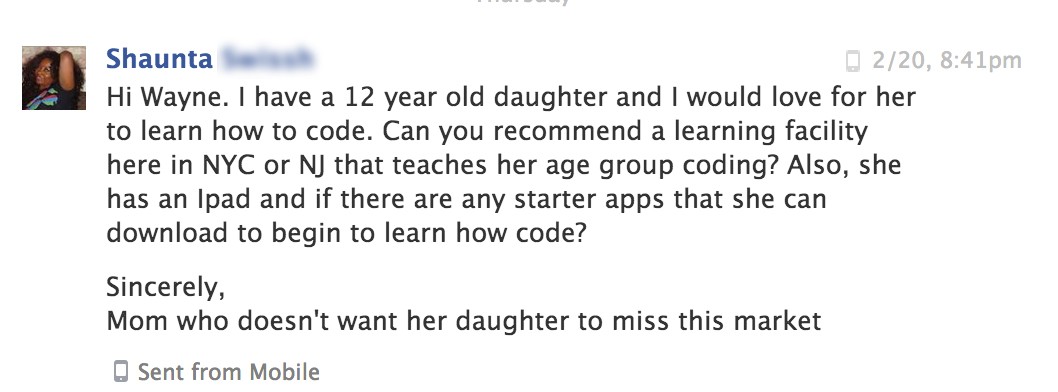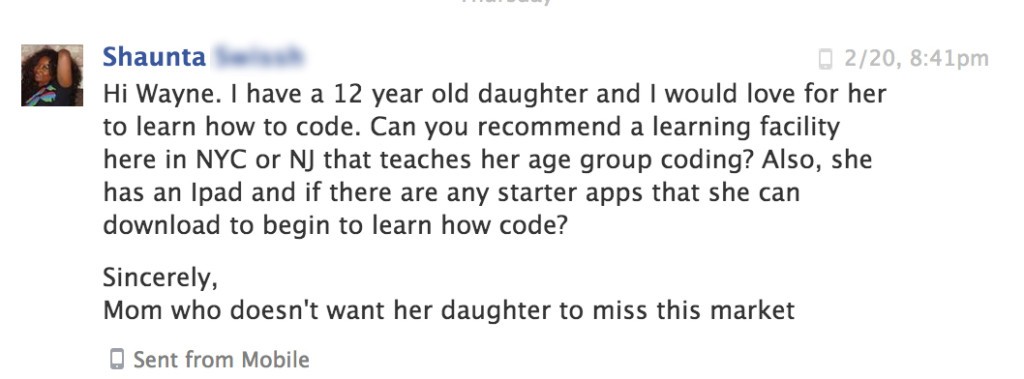

Over the past year, unfortunately the conversation about the falsehood of technology enabling meritocracy, “brogrammers” and the lack of women board members have been debated among Silicon Valley cohorts, press and entrepreneurs worldwide. Pattern matching continues to be the leading bias from investment decisions, hiring and just getting in the door at times for many minorities. The number of African-Americans startups that are funded is still below 1% which is detrimental when we take a deep breath and reflect that in 2014 such bias still exist. When we look at seed stage or Series A companies African-Americans make up of only 1%. African-Americans and Latinos make up of only 9.2% of the technology workforce.
With millions of dollars at stake and the competition for top tech talent, raising capital and customer acquisition being played out almost like the Hunger Games in Silicon Valley and San Francisco the conversation about diversity is often looked down on.
As Silicon Valley/Bay Area continues to lead in the world in technology innovation and creating tons of world wide news with billion dollar acquisitions such as the recent Facebook and Whatsapp deal, the debate continues for many African-Americans can they not only break into the tech workforce but can they be founders themselves. Just the past week I was asked on a San Francisco urban radio show can someone who’s black, didn’t attend Stanford, Harvard or MIT have a place in tech. The answer is yes, but that doesn’t mean it’s going to be easy.
You would think in 2014 the mindset of is “tech” for me would not be the case, especially near San Francisco, but it is. If you look at East Palo right next to Palo Alto it’s literally night and day in terms of opportunities, access and hope. One community on the rise is Oakland as the city is becoming more of a tech hub to support entrepreneurs. Oakland recently held their first Startup Weekend focused on Black Male Achievement.
Fortunately, despite the bias, pattern matching and lack of board seats for both women and African-Americans there’s some renewed energy that’s taking place among minority cohorts that are not only tackling the diversity problem in tech but is working to make sure the current and future generation of minority founders are not falling behind. These groups are using two Silicon Valley traditions, hackathons and pier programming style boot camps to bring minorities up to speed and in other cases showing what opportunities in tech are available in technology and entrepreneurship.
In 2013 The Level Playing Field Institute, founded by Freada Kapor Klein, Ph.D. held two Coding Hackathons for minority youth. One was in Oakland and the other at the Computer History Museum in Mountain View. Kimberly Bryant, founder of Black Girls Code continued her coding bootcamps accross the country and other African-American tech community leaders have launched coding initiatives such as YesWeCode which targets low-opportunity youth and provides them with the necessary resources and tools to become world-class computer programmers. New York based AllStar Code (http://allstarcode.org is a prep program connecting young black men to the tech industry. In Detroit Hajj Flemings and myself have launch Student Ventures, a program to expose students to the world of technology entrepreneurship and STEM. In Mimia, FL, Felecia Hatcher and Derick Pearson founded Code Fever , a series of weekend training and bootcamps to teach high school students and their parents to be technology to creators from learning how to pitch and ruby on rails.. Silicon Valley being the epicenter for coding, Code2040 which helps Blacks and Latinos college students with paid summer internships with technology startups, now in their third year is about to have their largest class yet. Black Founders based in San Francisco, has been holding hackathons at Historic Black Colleges ( HBCU) over the past year and just hosted GoodieHack, an idea Hackathon For Social Good In Under-Served Communities starting in Atlanta, GA. In Oakland, Shaun Tai and Linda Poeng has founded Oakland Digital Arts & Literacy Center (ODALC). ODALC works to increase digital literacy and opportunity among small business owners, local design students and entrepreneurs.
As the younger generation continues to grow up in a swipe first and mobile app world, there are not enough hackathons and coding bootcamps especially in underserved communities to help more parents such as Shaunta who doesn’t want their child to miss the market.